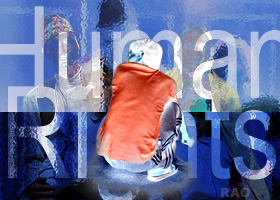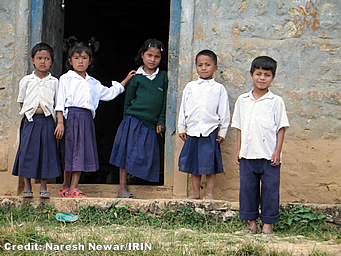
|
 |
| Nepal in Crisis 2006: Facts |
|
|
|
|
|
|
|
|
| Children still living in fear of Maoist rebels |
BANKE,
11 Sep 2006 (IRIN)
Every morning as 13-year-old Bimala Timilsina walks towards her Chandanath High School in Jumla, nearly 800 km northwest of the Nepali capital, Kathmandu, she is afraid that Maoist rebels will abduct her and force her to join their movement.
 |
|
After nearly 10 years of armed rebellion against the Nepalese state, the Maoists have for the past four months been involved in the peace process with the new interim government of seven national parties to end the decade-long violent conflict that has killed over 14,000 people in the Himalayan kingdom.
Since April, the two sides have had a series of peace talks following the end of the absolute rule of the Nepalese monarch, King Gyanendra, after a mass uprising against him jointly led by the rebels and the seven main parties.
Child rights advocacy groups in the country had hoped that the ongoing peace process would provide a safe environment for children compared to the years of conflict when over 400 children were killed and 1,000 more injured, according to the Child Workers in Nepal (CWIN), a local child rights' group.
"But even now, there is no protection and security for these innocent children who are constantly threatened and intimidated by the Maoists," said activist Saraswati Malla from the rights group, Insec.
Malla explained that the members of the Maoist-affiliated All Nepal National Students Union Revolutionary (ANNSU-R) visit schools along with the Maoist militants in their combat uniforms and force students to form Maoist associations in schools.
"The students become members out of fear and they in turn have to increase members in their associations and help the Maoists to collect donations in the villages," said 15-year-old Sudan Kharel from Dang, a remote district lying 500 km west of Kathmandu.
But the rebels reject such accusations saying that they never used children for their political or military activities. top
 |
|
But some rebels admitted that children were joining their programmes of their own will and not through force. "We cannot stop the children who are impressed with our ideology and interested in our party activities. They have also their own rights and freedom to make their choices," said Maoist worker Sunil.
However, the students who had suffered at the hands of the Maoist workers said that the rebels were not telling the truth. "The rebels often come to our schools and disturb us in the middle of our classes. Many of my friends missed their regular classes and were taken to the Maoist programmes even in the middle of exams," said 14-year-old Madhaba Sharma.
Several
children who spoke to IRIN said that the rebels also set up their mobile
and temporary camps near school areas. Only a few weeks ago, the Maoists
had assembled over 3,000 students at Bahumukhi Campus in Surkhet, 700 km
west of Kathmandu, said 16-year-old student Laxmi Regmi.
Copyright © UN Office for the Coordination of Humanitarian Affairs 2006
[ This report does not necessarily reflect the views of the United Nations]
Integrated Regional Information Networks (IRIN), part of the UN Office for the Coordination of Humanitarian Affairs (OCHA).

|
